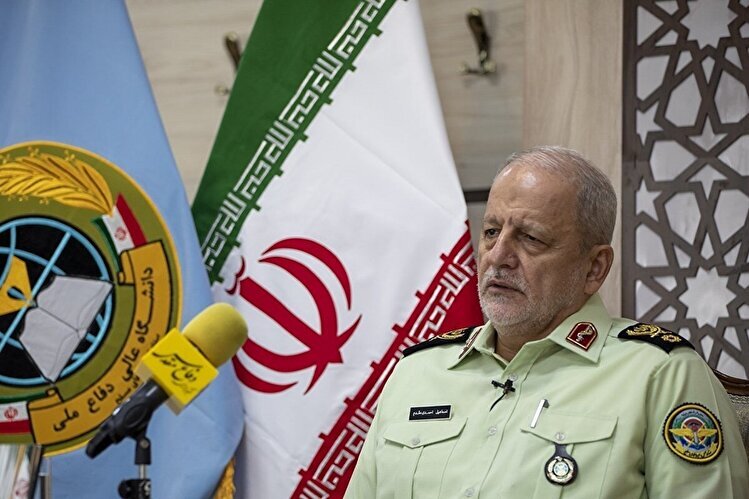The Common Point of Victory in the Mersad Operation and the 12-Day Imposed War Was the Coherent Presence of the People in the Field
TEHRAN (Defapress) - Brigadier General Ismail Ahmadi-Moghaddam, President of the Supreme National Defense University, in an interview with the Defapress correspondent, discussed the dimensions of Operation Mersad and the conditions of that era.

Referring to the general atmosphere of the country in the final months of the imposed war by the Ba'athist regime of Iraq against Iran, he stated: "In the final months of the imposed war by the Ba'athist regime of Iraq against Iran, the country faced challenges such as the consensus of the enemies of the Islamic Revolution, the arming of the Ba'athist regime with chemical weapons, attacks on oil tankers in the Persian Gulf, restrictions on oil exports, and severe economic pressure. Even the enemy's long-range aircraft targeted the Neka power plant and the Strait of Hormuz, and ultimately, our passenger plane was attacked by the Americans in the Persian Gulf."
Acceptance of the Resolution and Saddam’s Renewed Aggression
Brigadier General Ahmadi-Moghaddam continued: "On July 18, 1988, Iran accepted UN Security Council Resolution 598. However, contrary to his initial welcome of the resolution, Saddam did not accept the ceasefire and launched extensive attacks in the south and west of the country, leading to the advance of his forces into critical areas such as Ahvaz, Khorramshahr, Sumar, Sarab Niloufar (northwest of Kermanshah), and Gilan-e Gharb."
He added: "These operations paved the way for the attack by the Mujahedin-e Khalq (MEK) to overthrow the Islamic Republic. Under the name Foroughe Javidan Operation, they advanced from Sarpol-e Zahab to near Kermanshah without serious resistance, covering about 160 kilometers inside Iran within 8 to 10 hours."
The then-acting commander of the Najaf Ashraf Headquarters, referring to the reduction of combat forces after the announcement of the resolution and the assumption that the war had ended, emphasized: "After the MEK's attack, the Islamic Republic of Iran, by rapidly organizing scattered forces, rear units of the IRGC and the Army, and with the support of the Air Force and Army Aviation, managed to counter this surprise attack."
Brigadier General Ahmadimoghaddam stated that despite the air support from Saddam’s army, the MEK suffered a heavy defeat, saying: "The end of the war was considered a victory for the Islamic Republic of Iran and a defeat for its enemies, including the Ba'athist forces and the MEK terrorist group, which has martyred over 17,000 Iranians to date."
Praising the stance of Imam Khomeini (RA) in accepting the resolution, he noted: "Although officials were prepared to take responsibility for accepting the resolution, Imam Khomeini (RA) himself assumed this responsibility, and this decision became a lasting memory of his magnanimity and accountability."
The People’s Role in Victory
Brigadier General Ahmadi-Moghaddam, recalling the sacrifices of the people and the unknown martyrs in Operation Mersad, stated: "The common factor in the victory of Operation Mersad and the 12-day imposed war was the cohesive presence of the people on the battlefield. In Operation Mersad, despite lacking artillery and ground fire support, our forces resisted with light weapons, and the people joined them, just as in the recent imposed war by the Zionist regime, the people stood united, strong, and alongside the armed forces, supporting the system."
This commander of the Sacred Defense era emphasized: "The role of Martyr Sayyad Shirazi in coordinating this operation and Martyr Shoushtari as the commander of the Najaf Headquarters was crucial."
The Enemy’s Misunderstanding of Iran’s National Spirit
The President of the Supreme National Defense University attributed Operation Mersad and the recent Zionist attack on the country to the enemy’s lack of precise understanding of Iran’s domestic scene, stating: "The enemies of the country always base their analysis on the superficial layers of our society and remain unaware of the underlying layer, the deep bond between the people and the Islamic Revolution and Iran."
Brigadier General Ahmadi-Moghaddam continued: "The Iranian people set aside differences and unite in times of threat; this unity and popular cohesion are the most important support for the armed forces."
Referring to the difference between superficial grievances and opposition, he said: "Grievances are natural and even constructive, but they do not signify a desire for the collapse of the system or the disintegration of the country."
Exiled Opposition Holds No Place Among the People
Brigadier General Ahmadi-Moghaddam, pointing to the low standing of the exiled opposition in the domestic scene, stated: "They are not even taken seriously by the enemies of the Islamic Republic. In a sense, they are mostly performing theatrics and seeking political business."
Highlighting the importance of vigilance among officials and the people, he noted: "The strategic advantage of the Islamic Republic is its ability to recover quickly and deliver the final blow, an experience we witnessed both in the imposed war and in the recent conflict with the Zionist regime. However, we must not underestimate threats and should avoid reductionist views."
Prepared to Confront Threats
In conclusion, the President of the Supreme National Defense University said: "The Islamic Republic has multiplied its defensive preparedness in recent years and today possesses a high deterrence capability. The Iranian people, by being present on the scene, play an unparalleled role in foiling the enemy’s plots, and this presence is a divine blessing for the Islamic Republic."
